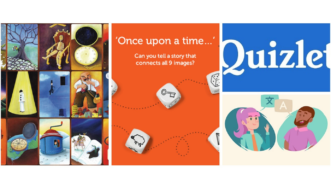Why writing about teaching senior learners?
A few weeks ago, when I was thinking about my experience as an ESL teacher and knowledge that I’ve acquired over the years, I must admit that I had a problem with finding something which would be eye-opening or that would surprise you. There are so many resources, professional blogs and teaching experts who have a great deal of knowledge to share and do that every day. And I? Is there anything that I could possibly give you? Actually, there is 😊. For a long time I was overlooking one experience that I thought other teachers wouldn’t find so intriguing as I do, but now I know that there are people who can do it 😊. For many years I’ve been teaching English to seniors. And I love it!
Here are my musts when it comes to teaching older learners:
#1 Be patient
For some it may seem a cliché, but it’s really essential during classes with seniors. They need a lot of our attention and understanding. I must say that elderly students are very eager to learn and have a lot of internal motivation, which is great. You don’t need to bother whether they do homework, let alone revise vocabulary, because it often becomes one of their daily routines. However, seniors have their limitations. For example, their memory doesn’t absorb information as quickly as the memory of younger students, or they need more time to process a complex grammar structure or a new idiomatic phrase. What’s my advice? Don’t rush! That was my mistake when I started working with senior learners. I wanted them to acquire new things lesson after lesson. I felt that if they didn’t see spectacular progress, they would drop out of my course. How wrong was I! The thing is that they’re definitely willing to learn, but you just need to understand their pace and adjust to it. Don’t push – some issue may seem trivial or easy for you (or younger students), but for them it can be an uphill task. Therefore, if they need more hours to practise the difference between Present Simple and Present Continuous, don’t hesitate and devote more time as it will bear fruit in the long term – believe me 😄. That leads us to my second observation.
#2 Be flexible
The faster you learn how to do it, the better for your well-being 😄. It was a great lesson to me. I’m very organized and have a carefully devised plan in my head for each class. I always try to anticipate possible problems, lags connected with some tasks and questions that can crop up. However, when teaching English to seniors I could see that my approach wasn’t always appropriate. I found out that my insufficient responsiveness affected class dynamics in a rather negative way. Again, I wanted to teach my students so much that I forgot that it had to be pleasurable for them as well. So I started to go with the flow more often and adopt an ad hoc approach at times rather than following the lesson plan. It turned out that my students really needed that – a more laid-back atmosphere and a lot of fun. For them it wasn’t only an English class, but also a social event, a meeting with friends.
How to make it work then?
You have to observe your group, learn to think on your feet and change your teaching styles when needed. Don’t stick to something that has always worked for your classes. It doesn’t necessarily mean that this time it will work out well too. For example, it happens that only one student appears in the class and they don’t really feel like learning what you’ve prepared for them, but they rather speak. There was some special event in their lives or they have some problem and they can’t find anyone to talk to as they’re often lonely. Just be that person. Resign from your meticulously created plan and be a human. Give them attention they need even if they don’t want to speak English, but their mother tongue. They can feel that they’re not ready to express themselves clearly in a language they learn. My other tip in terms of flexibility is to have a trick up your sleeve. For example, it’s great to always have something extra in your bag, for example a set of taboo cards, a game (like Dixit cards) or other time filler. It might also save your life when you see that your group is not in mood for serious thinking. All in all, make your students happy and satisfied after your class and don’t be afraid to do it sometimes at the expense of the real purpose of the lesson, i.e. learning English.
#3 Be a good listener
Paradoxically, listening isn’t the skill that just students should sharpen, but we as teachers should be absolute masters at it. In my opinion, you need to be a good listener to be a good communicator. And when it comes to teaching English to seniors, you have to take your listening skills to the next level. First of all, you sometimes need to lend an ear to them as seniors have a lot to say. They have many years of great experiences and stories to share. I’ve always found it fascinating what older people have seen, encountered and still remember. As a teacher I know that I can learn from them, but also use their memories and insights to make my classes unique and give seniors the chance to talk about issues they’re familiar with, but in a foreign language. Secondly, senior students are honest and that’s something we should definitely value. Personally, I feel that students are often reserved or afraid of expressing their needs in terms of classes, their form and teacher’s activities. They stick to what a teacher offers and it happens that instead of reacting or asking for changes, they just leave a course or skip classes. Seniors, on the other hand, are frank and take a critical look at how classes are conducted. Thanks to that, you can develop as a teacher because they tell you exactly what they like about your classes, what points you should improve and what they don’t feel comfortable with. And then if you listen to them, you’re half-way there to have great and inspiring classes.
#4 Be old-fashioned
…in your use of tools. Nowadays, there is an abundance of cutting-edge technologies for the classroom, from digital boards, through language learning applications, to virtual reality tools. However, all of them seem a bit irrelevant for classes with senior students because they’re often computer-illiterate. Let’s face it, it’s demanding and sometimes even impossible to keep up with all these innovations that emerge at lightning speed. Moreover, some of them are hard to understand at once. Therefore, while teaching senior learners, you have to figure out whether they feel good about technology or are totally out of touch with it. In case of the latter one, go for oldies but goodies 😊. Don’t be afraid of just using our good old whiteboards or blackboards. Instead of creating sets of vocabulary in a digital form, print flashcards. Use props and paper worksheets. Do whatever works for your class and doesn’t make students feel overwhelmed and confused.
What teaching English to seniors gave me
The list I’ve created for you may seem like stating the obvious, but as Steve Jobs said “Simple can be harder than complex: You have to work hard to get your thinking clean to make it simple. But it’s worth it in the end because once you get there, you can move mountains.”
Finally, I would like to share with you just one more thought. Teaching seniors is extremely rewarding. If you ever have the chance to teach senior students, don’t think twice and just do it. The time spent with them, their wisdom, willingness to learn and motivation will give you a boost that you’ve never experienced before. At least, it was like that in my case 😊
—————————
Check our post with some teaching tips for doing revisions focused on grammar and vocabulary.













Make them feel valorized
Teach with a smile
Create an atmosphere of friendly competitiveness
Hi Justa,
Just to let you know that we’ve shortlisted this blog post for this month’s TeachingEnglish blog award and I’ll be putting up a post about it on tomorrow’s TeachingEnglish Facebook page http://www.facebook.com/TeachingEnglish.BritishCouncil, if you’d like to check there for comments.
Best,
Ann
Thanks a lot!
Justa, thanks a lot for sharing your experience with us. I really would love and need to talk with you! I ‘ve been working with Seniors. Could you send me your contact via email? Thanks in advance
Hi there! It’s nice to here it. You can contact me at: [email protected]. Looking forward to your message
All great points and very valid.
Thanks!
Thanks for the article. How about web resource and teaching material?
Thanks 🙂 when it comes to teaching material I can’t point out specific ones as I’ve collected and used a lot of different resources throughout my career
Thanks for you’ve done for senior learners. I’m not an English teacher, I’m English student in the middle-age (50 ). I was jus looking for some tips how to learn when you are not very young and your memory doesn’t work as good as it used to be. Your article helps me a lot.
Thank you so much and I’m really happy that you find my article useful 🙂
Hi Justa
I’m in Brazil and I’m looking for a English Course online for senior. I’m 62.
Would you have a tip for me?
Thank You
Hi Carlos! I can’t really recommend any specific courses. Can someone else out here help Carlos?
Hi Carlos!
I’m an English teacher in Sao Paulo.Have you found the English teacher you were looking for?
In case you haven’t, here’s my email address: [email protected]
Marisa Moreira
Very useful, thank you! I have been working with adults lately – around their 40s and I should say that it is definitely the same with “the need to speak”. I remember one of my students bursting out crying when I asked her how she was in the beginning of the lesson. Such a simple question, but it seems like the lesson was the only true safe place for her to talk at that period of life. Yes, we “wasted” 20 minutes of times talking with her in a mother tongue but I truly believe that talk meant much more for her than some grammar structures. Changed my perspective of the usefulness and need to teach English to adults and seniors rather than children.
Maria, thank you so much for sharing your experience with us!
Maria,
This is the second time Ive hard of the English classroom being a “safe Zone” I interviewed an English teacher here in Japan for experiences with Seniors and came across 2 wonderful moving stories.. I coxed him to write them up and publish so I can share them, Both from WW II One from Hiroshima. Larry
Amazing!!!!!!!! Thank you so much for sharing your experience!
Thanks!
thanks for sharing this is awesome!
Thank you 🙂
Hello
I’m 69 years old, from Lima, Peru. I’m a teacher and just started teaching eight groups of elders at the Municipality of San Isidro in my hometown, and it has been so far a very rewarding experience. I’m handling 90 students a week on average, the oldest being 93, all real beginners! Thanks for your comments and advice, I’m sure I’ll need some more as time passes; it’s almost been only a month since I started and my more than 20 years of experience teaching English are not enough for all the discoveries I make every day.
We don’t have projectors or screens, I use a speaker with the audio recorded in a memory stick (which works Ok) and in trying to open a whatsapp group to send a couple of videos, I realized some of them don’t have a mobile phone. It was just in the second week that I noticed that some of them cannot even find where the exercises can be found in the book! Regards, Emma
Hi Emma! Thank you so much for taking the time to comment and share your experience with us! It’s great to hear that so many older students are eager to learn English, but it means we really need to pay attention to their needs, a lot of times change our ‘routine’ style of teaching and not take things for granted, right? Wishing you all the best and good luck with your classes!